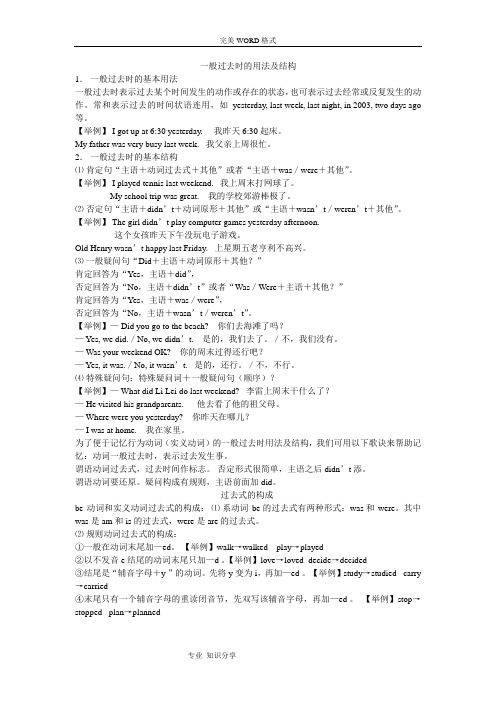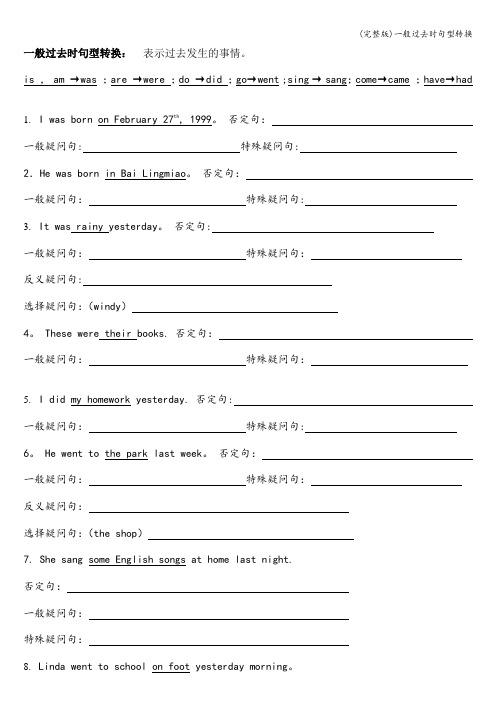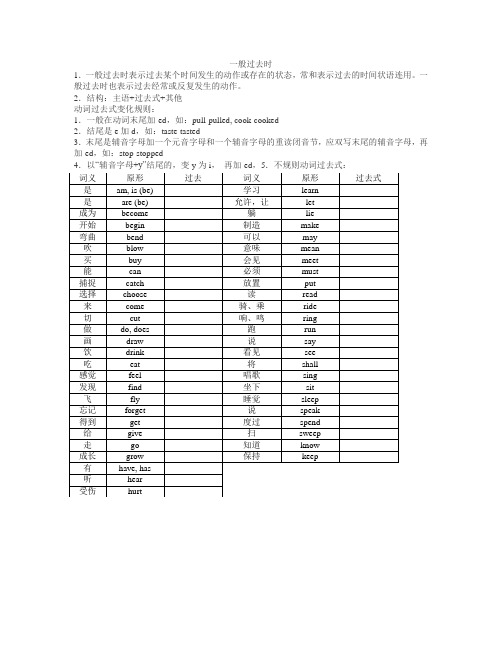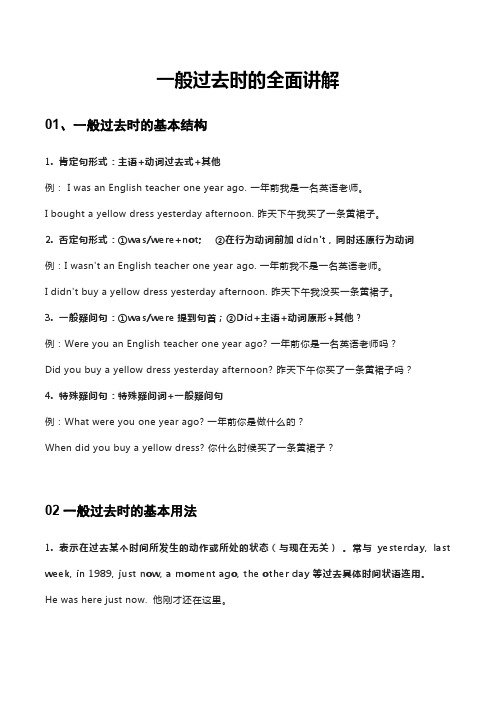一般过去时句型转换
一般过去时的用法及结构

一般过去时的用法及结构1.一般过去时的基本用法一般过去时表示过去某个时间发生的动作或存在的状态,也可表示过去经常或反复发生的动作。
常和表示过去的时间状语连用,如yesterday, last week, last night, in 2003, two days ago 等。
【举例】 I got up at 6:30 yesterday. 我昨天6:30起床。
My father was very busy last week. 我父亲上周很忙。
2.一般过去时的基本结构⑴肯定句“主语+动词过去式+其他”或者“主语+was/were+其他”。
【举例】 I played tennis last weekend. 我上周末打网球了。
My school trip was great. 我的学校郊游棒极了。
⑵否定句“主语+didn’t+动词原形+其他”或“主语+wasn’t/weren’t+其他”。
【举例】 The girl didn’t play computer games yesterday afternoon.这个女孩昨天下午没玩电子游戏。
Old Henry wasn’t happy last Friday. 上星期五老亨利不高兴。
⑶一般疑问句“Did+主语+动词原形+其他?”肯定回答为“Yes,主语+did”,否定回答为“No,主语+didn’t”或者“Was/Were+主语+其他?”肯定回答为“Yes,主语+was/were”,否定回答为“No,主语+wasn’t/weren’t”。
【举例】— Did you go to the beach? 你们去海滩了吗?— Yes, we did./No, we didn’t. 是的,我们去了。
/不,我们没有。
— Was your weekend OK? 你的周末过得还行吧?— Yes, it was./No, it wasn’t. 是的,还行。
/不,不行。
一般过去时的用法

一般过去时的用法一般过去时表示过去某个时间发生的动作或存在的状态。
常和表示过去的时间状语连用。
如:last year, yesterday等;也可表示过去经常反复发生的动作,常和often, always等频率副词连用。
例如:I saw him in the street yesterday. 昨天我在街上看见他了。
Li Mei always went to school on foot last year. 去年李梅总是步行上学。
注意:也可以用“used to +动词原形”表示过去经常或反复的动作。
eg. We used to get up early. 我以前总是早起。
(意指现在不早起了)1.一般过去时的形式:动词be: 第一人称单数和第三人称单数用was, 其余的人称一律用were。
动词have: 一律用had, 没有人称和数的变化。
行为动词:一律用过去式,没有人称和数的变化,行为动词的过去式有两类,一类是规则动词,另一类是不规则动词。
一般过去时动词的肯定、否定、一般疑问句和简略回答以及特殊疑问句的形式见列表:肯定、否定形式行为动词的过去时的否定式,要使用助动词do 的过去式did,后面的谓语动词要还原为原形。
注意:在非正式语如口语中,was not, were not, had not和did not 可以分别缩写成wasn’t, weren’t, hadn’t和didn’t。
2.一般过去时的几种句型(这里只讲行为动词)肯定句结构为:主语+动词的过去式+其他。
如:He went to the toy store yesterday. 他昨天去玩具店了。
否定句结构为:主语+did not (didn’t)+动词原形+其他。
如:He didn’t go to the toy store yesterday. 他昨天没去玩具店。
一般疑问句的构成:Did+主语+动词原形+其他?如:1) -Did you go to Beijing last week?-Yes, we did. (No, we didn't.)2) -Did you meet the businessman before?-No, I didn't. (Yes, I did.)特殊疑问句的构成:疑问词+did+主语+动词原形+其他?如:1) -What did you do last night?-I did my homework.2) -Where did you go last week?-I went to Shanghai with my parents.Ⅱ. 行为动词的一般过去式变化规则行为动词的过去式有规则变化和不规则变化两种。
一般过去时的用法和结构

一般过去时的用法及结构1.一般过去时的基本用法一般过去时表示过去某个时间发生的动作或存在的状态,也可表示过去经常或反复发生的动作。
常和表示过去的时间状语连用,如yesterday, last week, last night, in 2003, two days ago 等。
【举例】 I got up at 6:30 yesterday. 我昨天6:30起床。
My father was very busy last week. 我父亲上周很忙。
2.一般过去时的基本结构⑴肯定句“主语+动词过去式+其他”或者“主语+was/were+其他”。
【举例】 I played tennis last weekend. 我上周末打网球了。
My school trip was great. 我的学校郊游棒极了。
⑵否定句“主语+didn’t+动词原形+其他”或“主语+wasn’t/weren’t+其他”。
【举例】 The girl didn’t play computer games yesterday afternoon.这个女孩昨天下午没玩电子游戏。
Old Henry wasn’t happy last Friday. 上星期五老亨利不高兴。
⑶一般疑问句“Did+主语+动词原形+其他?”肯定回答为“Yes,主语+did”,否定回答为“No,主语+didn’t”或者“Was/Were+主语+其他?”肯定回答为“Yes,主语+was/were”,否定回答为“No,主语+wasn’t/weren’t”。
【举例】— Did you go to the beach? 你们去海滩了吗?— Yes, we did./No, we didn’t. 是的,我们去了。
/不,我们没有。
— Was your weekend OK? 你的周末过得还行吧?— Yes, it was./No, it wasn’t. 是的,还行。
/不,不行。
(完整版)一般过去时句型转换

一般过去时句型转换:表示过去发生的事情。
is , am →was ;are →were ;do →did ;go→went ;sing → sang;come→came;have→had1.I was born on February 27th, 1999。
否定句:一般疑问句: 特殊疑问句:2.He was born in Bai Lingmiao。
否定句:一般疑问句:特殊疑问句:3.It was rainy yesterday。
否定句:一般疑问句:特殊疑问句:反义疑问句:选择疑问句:(windy)4。
These were their books. 否定句:一般疑问句:特殊疑问句:5.I did my homework yesterday. 否定句: 一般疑问句:特殊疑问句:6。
He went to the park last week。
否定句:一般疑问句:特殊疑问句:反义疑问句:选择疑问句:(the shop)7. She sang some English songs at home last night.否定句:一般疑问句:特殊疑问句:8.Linda went to school on foot yesterday morning。
否定句:一般疑问句:特殊疑问句:反义疑问句:选择疑问句:(by bike)9.They lived in a big house 10 years ago. 否定句: 一般疑问句:特殊疑问句:10.The twins liked swimming last year. 否定句: 一般疑问句:特殊疑问句:反义疑问句:选择疑问句:(running)11.There used to be lots of flowers in the garden years ago.否定句:一般疑问句:特殊疑问句:。
时态三、一般过去时

一般过去时1.一般过去时表示过去某个时间发生的动作或存在的状态,常和表示过去的时间状语连用。
一般过去时也表示过去经常或反复发生的动作。
2.结构:主语+过去式+其他动词过去式变化规则:1.一般在动词末尾加-ed,如:pull-pulled, cook-cooked2.结尾是e加d,如:taste-tasted3.末尾是辅音字母加一个元音字母和一个辅音字母的重读闭音节,应双写末尾的辅音字母,再加-ed,如:stop-stopped4.以“辅音字母+y”结尾的,变y为i,再加-ed,5.不规则动词过去式:三、句型转换:一般过去式看动词,动词必须用过去式,变一般疑问句先找be 和情态动词,若有提前并大写,若无借助于did,实义动词要还原。
变否定句先找be 和情态动词,若有再后加not,若无借助于didn’t,实义动词要还原。
特殊疑问句由疑问词+一般疑问句构成。
四、标志词:1. yesterday、last+时间、时间+ago、just now、in+过去的时间一、单项选择:从下列各题后所给的四个选项中选择最佳答案填空。
(10)( )1.My father______ill yesterday.A.isn't B.aren't C.wasn't D.weren't( )2.______your parents at home last week﹖A.Is B.Was C.Are D.Were( )3.The twins______in Dalian last year.They______here now.A.are; were B.were; are C.was; are D.were; was ( )4.______your father at work the day_____yesterday(前天)﹖A.Was; before B.Is; before C.Was; after D.Is; after ( )5.—Who was on duty last Friday﹖—______.A.I am B.I was C.Y es, I was D.No, I wasn't ( )6. I cleaned my classroom ___________.A with three hoursB three hours agoC in three hoursD three hours before( ) 7. I came _______ my house two days ago .A back onB back toC to backD back( ) 8 . ___________? He did some reading at home.A What does your father do yesterday eveningB What does your brother do in the schoolC What did your brother do over the weekendD Where did your brother go last Sunday( ) 9. What did you do ________ ? I went to the movies.A next morning Bover the weekend C in the weekend D next Monday( ) 10. The koala sleeps _______,but gets up _________.A during the day; at the eveningB at day ;during nightC in the day ;during the eveningD during the day ; at night二、请用正确动词形式填空。
超详细一般过去时的全面讲解【附练习与答案】

一般过去时的全面讲解01、一般过去时的基本结构1. 肯定句形式:主语+动词过去式+其他例: I was an English teacher one year ago. 一年前我是一名英语老师。
I bought a yellow dress yesterday afternoon. 昨天下午我买了一条黄裙子。
2. 否定句形式:①was/were+not; ②在行为动词前加didn't,同时还原行为动词例:I wasn't an English teacher one year ago. 一年前我不是一名英语老师。
I didn't buy a yellow dress yesterday afternoon. 昨天下午我没买一条黄裙子。
3. 一般疑问句:①was/were提到句首;②Did+主语+动词原形+其他?例:Were you an English teacher one year ago? 一年前你是一名英语老师吗?Did you buy a yellow dress yesterday afternoon? 昨天下午你买了一条黄裙子吗?4. 特殊疑问句:特殊疑问词+一般疑问句例:What were you one year ago? 一年前你是做什么的?When did you buy a yellow dress? 你什么时候买了一条黄裙子?02一般过去时的基本用法1. 表示在过去某个时间所发生的动作或所处的状态(与现在无关)。
常与yesterday, last week, in 1989, just now, a moment ago, the other day等过去具体时间状语连用。
He was here just now. 他刚才还在这里。
What did you do yesterday? 你昨天做了什么事?2. 在过去一段时间内的经常性或习惯性动作。
【单元热点难点】译林版(三起)英语六年级上册Unit 3 Holiday fun 语法重点(含解析)
【单元热点难点】译林版(三起)英语六年级上册Unit 3 Holiday fun 语法划重点1. 语法精讲01、一般过去时的各种句型转换:(1)一般疑问句及其肯定和否定回答:含有行为动词的一般过去时的一般疑问句结构Did +主语+动词原形+其他?e.g.: A: Did you catch any fish? B: Yes, I did./No, I didn’t.否定句:主语+didn’t +动词原形+其他e.g.: We didn’t have lessons yesterday. 我们昨天没有上课。
含有be动词的一般过去时的一般疑问句Was/Were +主语+其他?e.g. : A: Was the book over there just now? B: Yes, it was./No, it wasn’tA: Were the students in the library yesterday? B: Yes, they were./ No, they weren’t.否定句:主语+ wasn’t / weren’t +其他e.g.: You weren’t hungry at all. 你一点也不饿。
(2)由Where, What和Why 引导的特殊疑问句的问答:A: Where did you go for the holiday? B: I went to a farm.(重在回答地点)A: What did you do for the holiday? B:I visited the Shanghai Museum.(重在事情。
)A:Why did you call me? B: Because I wanted to give you the fish. (重在陈述原因。
)(3)由How引导的特殊疑问句的问答:A:How was your holiday? B: It was great fun.02、有关动词过去式的变化:不规则动词有:(前一单元出现过的不再重复。
2025届高考英语语法复习一般过去时知识讲解讲义
高考英语一般过去时知识讲解一、结构和用法在英语学习中,时态的掌握是至关重要的一环。
其中,一般过去时作为描述过去发生的动作或存在的状态的时态,具有其独特的结构和用法。
(一)一般过去时的结构1、肯定形式结构:主语 + 动词过去式 + 其他例句:She went to the park yesterday.她昨天去了公园。
规则动词过去式的构成:一般在动词原形末尾直接加上-ed,如:look looked。
以不发音的字母e结尾的动词,去e再加-ed,如:live lived。
末尾只有一个辅音字母的重读闭音节(辅元辅结构),先双写这个辅音字母,再加-ed,如:stop stopped。
末尾是辅音字母+y结尾的动词,先变y为i,然后再加-ed,如:study studied。
2、否定形式结构1:主语 + was/were + not + 其他(be动词的否定)例句:He wasn't at home this morning.他今天早上没在家。
结构2:主语 + didn't + 动词原形 + 其他(行为动词的否定)例句:I didn't know you like coffee.我之前不知道你喜欢喝咖啡。
3、一般疑问句结构1:Did + 主语 + 动词原形 + 其他?例句:Did you go to Beijing last week? 你们上周去北京了吗?结构2:Was/Were + 主语 + 表语?例句:Were you a student 10 years ago?10年前你是学生吗?4、一般过去时的特殊疑问句的构成结构:疑问词 + did + 主语 + 动词原形 + 其他?例句:What did you do last night?昨天晚上你做了什么?常见的特殊疑问词有:who, what, whose, which, when, where, why, how, how long, how much等。
一般过去时
(5) 表示在此之前一段时间内经常或反复的动作。 常与always,never等连用。 Mrs. Peter always carried an umbrella. 彼得太太过去老是带着一把伞。 (只是说明她过去的动作,不表明她是否常带着伞。) 比较 Mrs. Peter always carries an umbrella. 彼得太太老是带着伞。 (说明这是她的习惯,表明她仍然还习惯总带着一把伞) Mrs. Peter is always carrying an umbrella. 彼得太太 总是带着一把伞。 (表示说话者对这一动作或行为厌烦) I never drank wine.我以前从不喝酒。 (不涉及到说明是否喝酒)
翻译下列句子: 1.我上周去看爷爷和奶奶了。 2.你的弟弟踢足球了吗?不,他没踢足球。
3.你读这本书了吗?
4.妈妈昨晚没看电视,她去阿姨家了。
5.我们昨天没去公园,去了动物园。
1. I visited my grandfather and grandmother last week. 2.did your brother play the football?/no,he did not. 3.did you read this book? 4.mother did not watch the TV,she went to my aunt's house. 5.we did not go to the park yesterday,we went to the zoo..
举例说明: He was here only a few minutes ago. (仅仅几分钟前他还在这里。) I came home just now. (我刚回到家。)
I got up very early this morning. (今天早晨我起床很早。) He was late for school again today. (今天他又迟到了。)
小升初语法专项-一般过去时(通用版,含答案)
小升初语法专项集训-一般过去时一、一般过去时的定义一般过去时是表示过去某个时间里发生的动作或状态,或过去习惯性、经常性的动作、行为。
常用的时间特征词有:yesterday,yesterday morning,yesterday afternoon,yesterday evening,the day before yesterday(前天),last night,last week,last month,last year,a moment ago(刚才),just now(刚才),two days ago,a week ago,in 1990等。
二、句子结构(1)一般过去时的肯定陈述句:主语+ 动词过去式+ 宾语或表语。
例如:He worked in Shanghai ten years ago.(2)一般过去时的否定句:a.主语+ didn`t + 动词原形+ 宾语。
(did + not = didn't)He didn't do morning exercises yesterday.b.主语+ wasn`t/weren`t +表语。
(was + not = wasn't were+ not = weren't)He wasn't an English teacher ten years ago.(3)一般过去时的一般疑问句:a. Did + 主语+ 动词原形+ 宾语? 例如:Did you study English in 1990 ?b. Was/Were + 主语+ 表语? 例如:Was he a pupil five years ago ?(4)一般过去时的特殊疑问句:a.特殊疑问词+ did + 主语+ 动词原形+ 宾语? 例如:What did you do last Sunday?b.特殊疑问词+ were/was + 表语? 例如:Who was at the zoo yesterday?三、规则动词过去式变化规则一、写出下列单词的过去式。
- 1、下载文档前请自行甄别文档内容的完整性,平台不提供额外的编辑、内容补充、找答案等附加服务。
- 2、"仅部分预览"的文档,不可在线预览部分如存在完整性等问题,可反馈申请退款(可完整预览的文档不适用该条件!)。
- 3、如文档侵犯您的权益,请联系客服反馈,我们会尽快为您处理(人工客服工作时间:9:00-18:30)。
一般过去时句型转换Revised on November 25, 2020
一般过去时句型转换: 表示过去发生的事情。
is , am→was ;are →were ;do →did ;go→went ;sing → sang;come→came ;have→had 1.I was born on February 27th, 1999. 否定句:
一般疑问句:特殊疑问句:
2.He was born in Bai Lingmiao. 否定句:
一般疑问句:特殊疑问句:
3.It was rainy yesterday. 否定句:
一般疑问句:特殊疑问句:
反义疑问句:
选择疑问句:(windy)
4. These were their books. 否定句:
一般疑问句:特殊疑问句:
5.I did my homework yesterday. 否定句:
一般疑问句:特殊疑问句:
6. He went to the park last week. 否定句:
一般疑问句:特殊疑问句:
反义疑问句:
选择疑问句:(the shop)
7. She sang some English songs at home last night.
否定句:
一般疑问句:
特殊疑问句:
8.Linda went to school on foot yesterday morning.
否定句:
一般疑问句:
特殊疑问句:
反义疑问句:
选择疑问句:(by bike)
9.They lived in a big house 10 years ago. 否定句:
一般疑问句:
特殊疑问句:
10.The twins liked swimming last year. 否定句:
一般疑问句:
特殊疑问句:
反义疑问句:
选择疑问句:(running)
11.There used to be lots of flowers in the garden years ago. 否定句:
一般疑问句:
特殊疑问句:。
